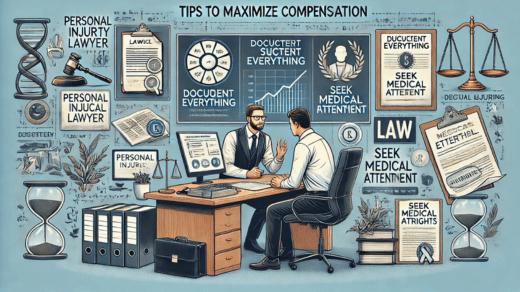
Pursuing a personal injury claim is your right if you’ve been injured due to someone else’s negligence. However, the process can be overwhelming, and securing the maximum compensation often involves more than just submitting a claim. From gathering evidence to negotiating settlements, various factors come into play. This article aims to provide actionable tips from experienced personal injury lawyers to help you maximize your compensation.
Gathering Evidence and Documentation
The foundation of any successful personal injury claim is robust evidence and thorough documentation. Whether you’ve had a slip-and-fall accident or a car crash, the more detailed your evidence, the stronger your case. Photographs, witness statements, and police reports are vital to your evidence library. Immediately after an accident, if you’re able, take photos of the scene, your injuries, and any property damage. This will be invaluable when substantiating your claims.
In a discussion with an accident attorney Jersey City NJ, you’ll often hear that medical records are indispensable. They validate the extent of your injuries and serve as a timeline, connecting the accident to your injuries. Combining this with a detailed journal documenting your physical and emotional state post-accident can build a compelling case for compensation.
Importance of Timely Medical Attention
Seeking medical attention promptly is essential for your health; it holds significant weight in your personal injury case. Delays in receiving medical care can weaken your claim and give insurers a reason to downplay the severity of your injuries. Adhering to medical advice and following through with recommended treatments will document the continuous impact of your injury, further strengthening your case.
Regular medical check-ups and obtaining specialist reports can provide a comprehensive view of your medical condition. This extensive medical history can substantiate claims for pain and suffering, lost wages, and ongoing medical expenses, which are crucial for maximizing compensation.
Navigating Insurance Claims
Filing an insurance claim is often the first official step toward compensation, but insurance companies’ primary goal is to minimize their payout. Understanding how to navigate this process effectively is crucial. Start by reporting the incident to your insurer as soon as possible. Provide all the necessary documentation and be truthful; any inconsistencies can harm your claim.
Insurance adjusters are trained to minimize payout amounts, so only discuss details with a clear mind or under stress. Resist the urge to accept early settlement offers, as these tend to be lower than you could receive. A well-drafted demand letter detailing your damages and the compensation you seek can set a firm foundation for negotiations. Remember, being well-prepared and persistent is critical to maximizing your payout.
Negotiating a Fair Settlement
Negotiating a fair settlement involves understanding the full scope of your damages and being assertive in your demands. Beyond immediate medical expenses, consider future medical costs, lost wages, and pain and suffering. Derive estimates for each factor to arrive at a compensation figure reflecting your injuries’ actual impact.
A good strategy is starting negotiations with a figure higher than you intend to settle for, giving you room to maneuver. Provide detailed documentation and rational arguments to support your demands. Be patient and prepared for multiple rounds of discussions. In cases where negotiations stall, the willingness to take your case to court can be a powerful leverage. This approach often encourages insurers to offer a more reasonable settlement amount to avoid the expenses and uncertainties of a trial.
When to Seek Legal Representation
While you can handle minor claims independently, more complex cases involving significant injuries or disputed liabilities often require professional legal representation. Personal injury lawyers bring specialized expertise and experience, increasing the likelihood of a favorable outcome. They can accurately assess the value of your claim, negotiate effectively with insurance companies, and represent you in court if necessary.
Consulting with multiple attorneys and choosing one with a strong track record in personal injury cases is advisable. They can also relieve you of the stress and complexities involved in these cases, allowing you to focus on your recovery. Remember, many personal injury lawyers in Jersey City work on a contingency fee basis, meaning they only get paid if you win your case, making their services accessible regardless of your financial situation.
Conclusion
Maximizing your compensation in a personal injury case requires a systematic approach and an understanding of the various factors. By gathering robust evidence, seeking timely medical attention, navigating insurance claims effectively, negotiating assertively, and knowing when to seek legal representation, you significantly increase your chances of receiving the compensation you deserve. Remember, a well-prepared and persistent approach is critical to ensuring justice and financial relief for injuries and losses.





